Adapting to Win

Реклама. ООО «ЛитРес», ИНН: 7719571260.
Оглавление
Noriyuki Katagiri. Adapting to Win
Отрывок из книги
Adapting to Win
HOW INSURGENTS FIGHT AND DEFEAT FOREIGN STATES IN WAR
.....
Third, Gil Merom argues that weaker actors are likely to win when their opponents are democratic and susceptible to pressure from antiwar forces at home. Their chance of victory increases when middle-class constituents, who reject the high costs of lengthy war because the costs fall directly on them and because they oppose war on moral grounds, become strong antiwar forces to block the democratic government from raising the level of violence necessary to win. Soon enough, they begin to threaten to punish the government electorally. Merom’s argument centers on an important dynamic surrounding the process of how democratic governments become weak through the mismanagement of war on the domestic front.37 The theory speaks to a host of insurgencies in Africa, South and Southeast Asia, and Latin America where many Western democracies have underperformed because they succumbed to powerful pressure to withdraw from those wars. From a broader perspective, Merom’s work advances an important research project on why democracies may fight poorly, especially in small wars and in comparison with nondemocracies. Research has shown that some democracies are prone to lose wars because they are more susceptible to electoral punishment than are nondemocracies. Voters and the mass media are sensitive to spectacular attacks that can shift voting patterns and constrain the ability of democratic leaders to wage war.38 By looking specifically into democracies in small wars, Merom’s work adds pessimism to the sense of vulnerability felt by many democracies constrained by the domestic effects of antiwar norms and institutions.
Fourth, Jeffrey Record argues that external aid is the key to underdog victory. Reviewing eleven insurgent wars from 1775 to 2007, he argues that external assistance correlates more consistently with insurgent success than any other explanation. Acknowledging some roles played by the resolve to fight, strategy, and regime type, he argues not that external aid is sufficient for insurgent victory but that it plays a crucial role in war outcomes between the strong and weak.39 Similarly, Paul Staniland argues that resources and the structure of the preexisting social networks of insurgent groups are crucial parts of their mobilization and operation.40 Material support may be especially significant if it comes from states that can offer firepower, funding, training, and intelligence far beyond the ability of these actors. Some states have incentives to support terrorist groups primarily for strategic reasons, such as to influence neighbors, topple regimes, counter U.S. hegemony, or advance ideologies.41 But state sponsorship is not always helpful to terrorist groups when they risk being the next target. Sponsors that provide safe haven can have incentives to provide information about the groups to the opponent in order to avoid getting into trouble with it.42 After all, as I show in the empirical chapters, the support-based theory functions as part of sequencing theory because they both show how resources enable insurgents to fight both guerrilla and conventional wars.
.....